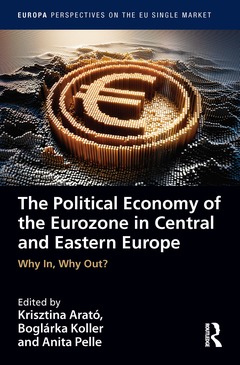The Political Economy of the Eurozone in Central and Eastern Europe Why In, Why Out? Europa Perspectives on the EU Single Market Series
Coordonnateurs : Arató Krisztina, Koller Boglarka, Pelle Anita

The idea for this volume came from the enigma that some Central and Eastern European (CEE) European Union (EU) member states have been keen to join the Eurozone while others have shown persistent reluctance. Moreover, the attitudes towards joining have seemingly not correlated with either the level of economic development or the time spent as part of the EU, nor with any other rational reason such as the level of integration into the EU real economy, or the level of trust in the EU on the part of the public. Therefore, at first sight, the answer to the question ?why in, why out?? remains rather unclear.
The attractiveness of the currency union has nevertheless not disappeared for the CEE countries. Despite the Eurozone crisis of 2010?13, it was during that time that the Baltic states introduced the euro. Then, after a few years of inactivity, Croatia and Bulgaria successfully applied for membership of the exchange rate mechanism in July 2020, amid the economic crisis caused by the coronavirus (COVID-19) pandemic. At the same time, the three Visegrad countries still using their national currencies ? Poland, Czechia and Hungary ? no longer have a target date to join the monetary union. This volume aims to discuss these issues from horizontal aspects and through country studies, with contributions from expert authors from, or closely related to, the CEE region.
Part I: Horizontal Issues
1 Seventeen Years in the European Union: The Questions of Monetary Integration in Central and Eastern Europe
Krisztina Arató, Boglárka Koller and Anita Pelle
2 International Political Economy and Eurozone Membership of Post-transition Economies: A Theoretical Framework
Anita Pelle
3 Eurozone Membership, Economic and Political Gains and Losses
Christian Schweiger
4 Are Democratic Backsliding and Staying out of the Eurozone Interconnected?
Krisztina Arató and István Benedek
5 The Euro and the Collective Identities of Central and Eastern European Nationals
Boglárka Koller
6 The Global and the Eurozone Crises and their Effects on Central and Eastern Europe’s Economic Performance
Gabriella Tabajdi and Marcell Zoltán Végh
7 Companies in Central and Eastern Europe and Eurozone Membership: An Attempt at a Microeconomic Analysis
Marta Götz and Barbara Jankowska
8 The Banking Union and the Central and Eastern Europe Countries
Katalin Mérő
Part II: Country Studies
9 Eurozone Integrational Project Assessment: Economic Lessons from Slovenia and Croatia
Maks Tajnikar, Petra Došenović Bonča and Ivan Rubinić
10 Slovakia in the Eurozone: Tatra Tiger or Mafia State inside the Elite Club?
Zsolt Gál and Darina Malová
11 Poland and Euro Adoption: From Integration-driven Enthusiasm to Post-pandemic Uncertainty
Jakub Borowski
12 The Hungarian Eurolessness: From Eulogy to Neutrality and Beyond
Olivér Kovács
13 The Czech Republic and the Euro: Not Now, or Not Ever?
Vladan Hodulák and Zdeněk Sychra
14 The Baltic States and the Eurozone
Magnus Feldmann and Vytautas Kuokštis
15 A Tale of Two Peripheries: The Euro Accession in Bulgaria and Romania
Cornel Ban and Clara Volintiru
16 Central and Eastern Europe and the Euro in the 2020s: What is on the Horizon?
Krisztina Arató, Boglárka Koller and Anita Pelle
Krisztina Arató is Professor of Political Science, Eötvös Loránd University (ELTE), Hungary.
Boglárka Koller is Professor of European Studies, University of Public Service – Ludovika, Hungary.
Anita Pelle is Jean Monnet Professor in Economics, University of Szeged, Hungary.
Date de parution : 07-2021
15.6x23.4 cm
Date de parution : 07-2021
15.6x23.4 cm
Thème de The Political Economy of the Eurozone in Central and... :
Mots-clés :
European Deposit Insurance Scheme; ERM Ii; Cee Country; ECE Country; Eurozone Accession; Eurozone Membership; EU Member State; PSD Government; Cee Member State; Cee Member; Cee Region; Euro Area; Euro Adoption; non-Eurozone Members; Cee State; Nominal Convergence Criteria; Public Administration; Czech Koruna; Single Resolution Mechanism; Gdp Growth; Global Financial Development Database; International Monetary Fund; Cee Bank; Fico Government



